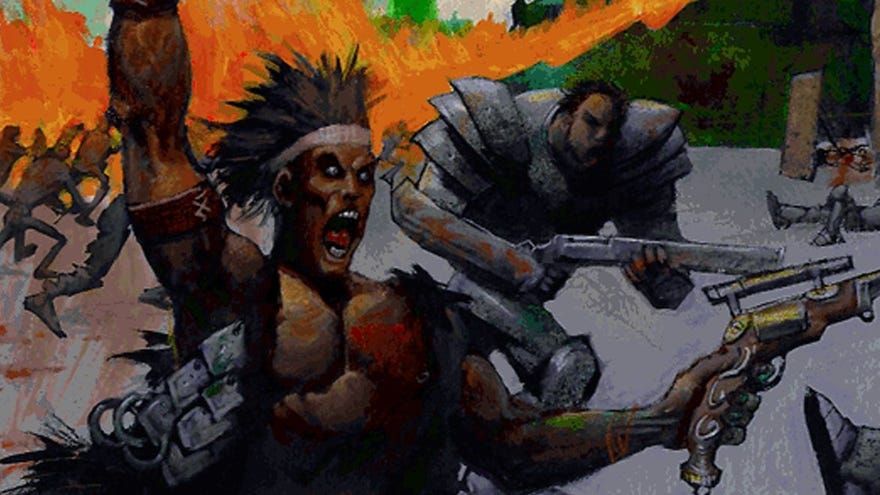The Rally Point: The 25 year patch of Emperor Of The Fading Suns proved me wrong
Twilight all
We've all worn the rose-coloured glasses when it comes to old games. It's a real hazard of the job when you started out covering stuff from the 90s. It's less common though, to fall afoul of whatever its opposite is. The uh, yellow-tinted glasses, maybe? My point is that I did you all a disservice when I described Emperor Of The Fading Suns as "an intriguing, ambitious, crap mega 4X" last year. It was a remarkable game, and more remarkably still, its developers Holistic Design Inc. recently updated it with a major patch, 25 years after its original release.
It's a lot better than I remember. And only some of that is down to the patch.
HDI never really got the recognition they deserved. Pretty much all their games were solid, and original and unconventional, even by the inconsistent standards of 90s strategy games. I've mentioned Hammer Of The Gods before, but it's their 14th Century Venetian mercantile/polit/pope-assassinating simulator Machiavelli the Prince that Emperor Of The Fading Suns compares to best.
Imagine Civilization crossed with a traditional hex-grid wargame. Your research is almost entirely military, and built infrastructure is geared towards harvesting resources and smushing them together into more advanced ones, in order to manufacture better unit types. Now imagine that instead of one planet, you're fighting over dozens. But where your typical space 4X treats each planet as a single tile, in EOFS every planet is a full hex map of its own. Your rivals are on different planets altogether, so you'll be simultaneously sending armies across planet surfaces, and spacefleets out to get a foothold on more worlds.
There's no need to grind out a conquest of every last planet, because the goal here is to get everyone else to acknowledge that you've won.
Each planet is linked in a fixed pattern, a bit like AI War, so a lot can change depending on where everything is. All this is, I think, where I misjudged EOFS. The prospect of conducting multiple simultaneous games of Civ over 40 planets sounds exhausting. But it's not actually necessary. There's no need to grind out a conquest of every last planet, because the goal here is to get everyone else to acknowledge that you've won via an election system very similar to Machiavelli's.
Each of your rivals is another noble house contesting the vacant Imperial throne in a neofeudal system with a "high tech, high ignorance" style theocratic culture. Each house can vote, and whoever wins becomes the regent, who can appoint three other houses to positions of influence over leftover Imperial fleets and forts. At first everyone votes for themself, but it's rarely long before someone is strongarmed or bribed into tipping the scales. Hold the regency for long enough and you can declare yourself Emperor, triggering everyone to take you down or admit they can't.
Winning by election isn't uncommon in 4X design now, but its being the only goal is a clue. EOFS's roleplaying heritage is what it's built on conceptually, even if it's not an RPG as such. You're not a generic empire, you're an established power within a particular structure. There are other powers too, non-playable but potentially game-changing. The League, for one, who gladly trade resources with anyone, and own a stronghold on everyone's homeworld. They start out with a tonne of resources (present on the map as moveable, capturable cargo), so everyone buys from them to cover shortfalls, and they have a large fleet to move them around. They also vote in elections, making a bribe to the League an obvious power play.
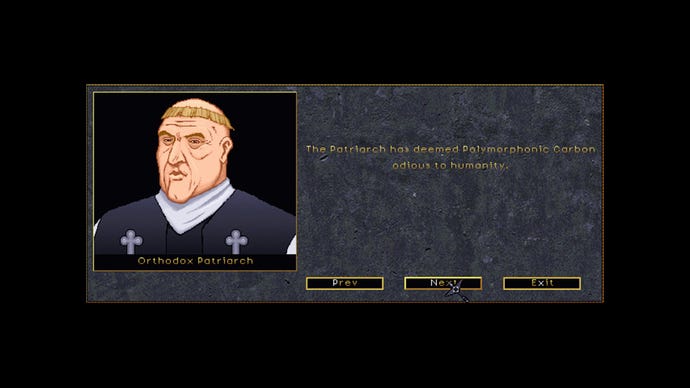
But if the League ever make enough money, they'll immediately close up shop and try to seize the empire for themselves. Suddenly those merchant fleets are a threat, and those guards on your homeworld are invaders. Then there's the Church, whose goals are rooting out heresy and retaining theocratic authority over the throne. They don't directly fight for it, but they pressure any potential leader to sign the Holy Writ, acknowledging their supreme status so that even if you win, you don't quite win. Players of Solium Infernum have probably spotted a few parallels.
Meanwhile, there are two alien forces out there too: the Symbiot zerg-plague that wants to consume and absorb everything, and which one of the Imperial officers appointed by the regent is given a garrison and fleet specifically to contain... but there's nothing stopping them from using those forces for their own ends instead, leaving the monsters unchecked. The other are the Vau, who make no attacks, and even have a spot on the diplomacy screen. But the only thing they offer is to buy maps of all the known worlds. What do they want those for?.
It's a game of power plays. Skulduggery and secret deals, and personalising beefs with your rivals. It's all about the mood, helped along by the surprisingly atmospheric music and an in-game encyclopedia that's written by fictional priests, in flowery and dogmatic language that reveals very little technical information and a lot about the church's zealotry. This even comes into play with research. Any technology can be proscribed as heretical, either because the church hates it, or because someone has bribed them. Losing an arms race? Have their best weapons banned. Researched something you're not using much? Sell it to someone and then have the church proscribe it. Technology needs to be maintained once unlocked, and this is done in specific labs that you've built somewhere on your planets. You can keep heretical knowledge instead of deleting it, but if a rival gets a look at your lab and sells that info to the church, expect a visit from the Inquisition, or even outright excommunication.
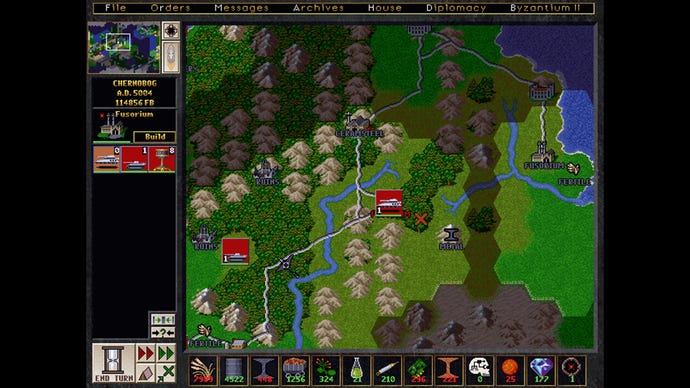

It's not so hard to get a look either, since spaceships can drop anywhere on a planet. Adding these to a hexfight makes for some unique tactical situations, and sometimes means two houses are fighting an independent world's defences at once, or even jointly occupying it. It's not as overwhelming as it sounds either. Moving fleets is very simple, and defenders in orbit can lock down a planet pretty well, letting you ship armies from pacified worlds to new battlegrounds, rather than endlessly multiplying the workload. The limited interplanetary connections mean that the further you are from rivals or Church or League holdings, the longer you have to prepare for their nonsense, and planets can form natural chokepoints allowing for some risky astro-geopolitical gambits. I've had one map where a difficult early invasion of two well-defended indie worlds let me seal off seven planets for the cost of defending two in space, and control access to the galactic capital. There, you see, is where the throne is. Nobody can build or fight there, but without a noble on the capital, you can't vote at all, and spies and assassins can still operate. One good assassination followed by a blockade could politically ruin even my most powerful rivals.
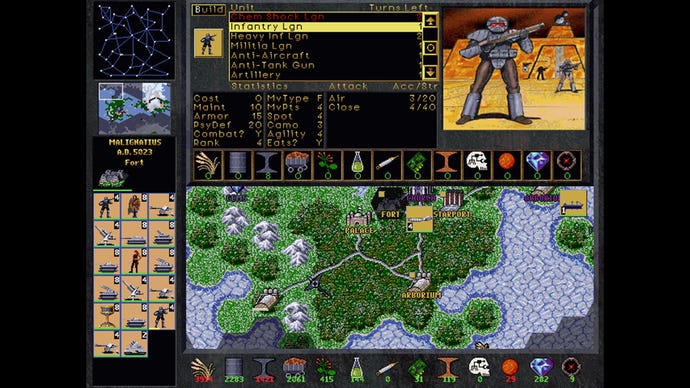
The wargame part is also much less complex than usual. There are multiple combat phases, but they resolve quickly, roughly midway between the ancient Civ-style "push unit A into unit B" and Shadow Empire's full complications. It's small fry to a wargame veteran, but there's enough there to make unit choices interesting and colourful, particularly as each requires different resources. A basic tank just takes metal, but advanced units might be chemically enhanced super soldiers, or circuitry-laden cyborgs. One option even requiries you to ship resources between planets to fuel manufacturing, though the AI never has to worry about that, and I'd advise against it until you know the game well enough to want more challenge.
Almost inevitably, that's where EOFS falters. AI is still the biggest bottleneck for strategy game development, and although the recent patch has made improvements, all these possibilities remain mere possibilities a lot of the time. For all its design cleverness, the AI really can't take advantage of it, being too passive and direct to really lean into its themes. You can, interestingly, get some good deals and friendly relations out of people, as they're not prone to fanatical player-loathing, and one of the options in its then-advanced (and now still quite robust) diplomatic screen is to trade for a "future favour", or even pay for something with "I'll appreciate it".
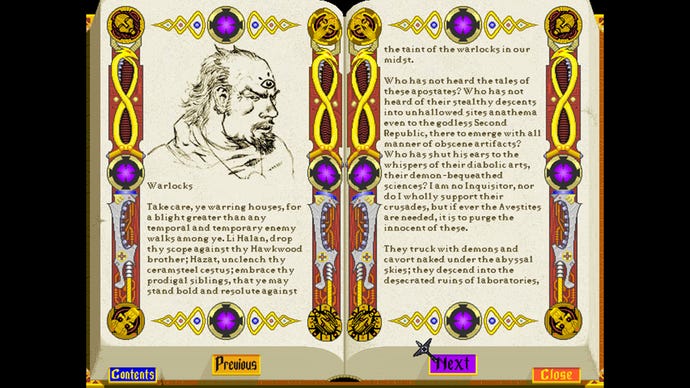
The AI has few of the economic restrictions you do, so will spread factories across nearly every surface. They generally fill them with cannon fodder, but the sheer numbers distort military analysis, and lead to some grindy invasions and occasionally severe, game-ruining bugs. Fortunately the patch emphasises modability, and a common fan fix (limit where the factory-building Engineer units can be trained to contain their spread) is easy. There's a very user-friendly map editor too.
There are UI problems, in particular the laborious way it requests manual orders for every city that produced a unit last turn. I'm surprised by how little this bothered me, but it's definitely a drag. It's a very old game, at the end of the day, and even dedicated patching and modding can only go so far. This time, though, Emperor of the Fading Suns has really grabbed me. I'm in danger of banging on about "vibes-based" games too much lately, and of lauding games like Terra Invicta for "living in your imagination", but it's really made the difference. This has personality and a pulpy charm, and 90s technical and control limitations aside, it feels fresh and creative, like it's working from its own ideas book rather than starting out with "be a 4X" and throwing stuff at the wall. I haven't even mentioned that your units can get the plague, or spread it with bioweapons, or even, sort of, totally order an infected ship's crew to land on a rival's planet and just... see what happens.
It's that kind of game. You'll drastically outsmart the AI with even the simplest of gambits, but play it as a story for yourself and it really comes into its own. Maybe that's overgenerous, but if overstating the appeal of its ambition and intrigue is what it takes to correct how unfair I was to it before, I'll take it, and any other game that wants to reach for the stars again.
